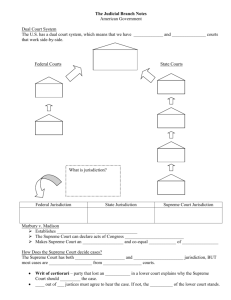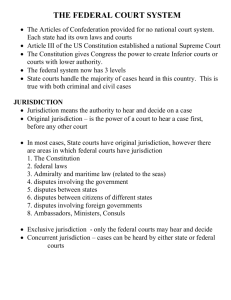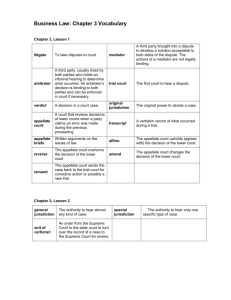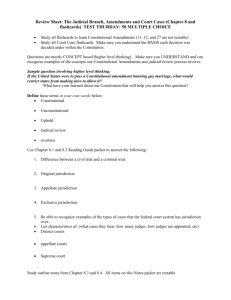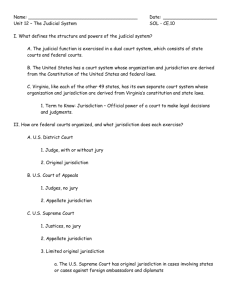Unit 6 A Answers
advertisement
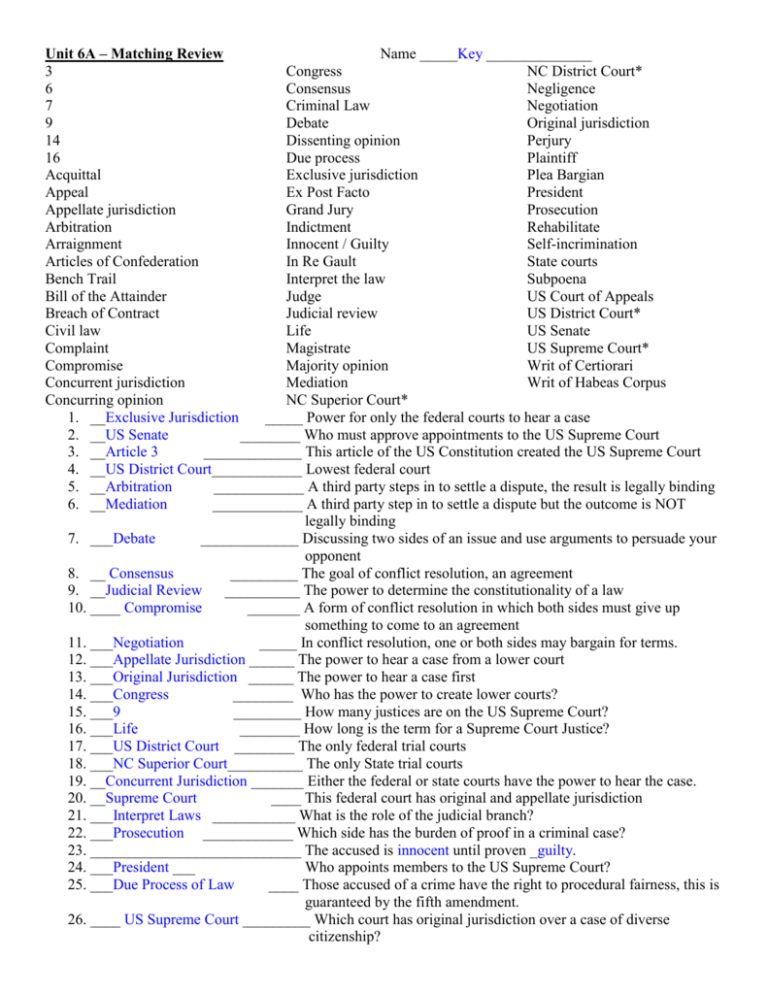
Unit 6A – Matching Review Name _____Key ______________ 3 Congress NC District Court* 6 Consensus Negligence 7 Criminal Law Negotiation 9 Debate Original jurisdiction 14 Dissenting opinion Perjury 16 Due process Plaintiff Acquittal Exclusive jurisdiction Plea Bargian Appeal Ex Post Facto President Appellate jurisdiction Grand Jury Prosecution Arbitration Indictment Rehabilitate Arraignment Innocent / Guilty Self-incrimination Articles of Confederation In Re Gault State courts Bench Trail Interpret the law Subpoena Bill of the Attainder Judge US Court of Appeals Breach of Contract Judicial review US District Court* Civil law Life US Senate Complaint Magistrate US Supreme Court* Compromise Majority opinion Writ of Certiorari Concurrent jurisdiction Mediation Writ of Habeas Corpus Concurring opinion NC Superior Court* 1. __Exclusive Jurisdiction _____ Power for only the federal courts to hear a case 2. __US Senate ________ Who must approve appointments to the US Supreme Court 3. __Article 3 _____________ This article of the US Constitution created the US Supreme Court 4. __US District Court____________ Lowest federal court 5. __Arbitration ____________ A third party steps in to settle a dispute, the result is legally binding 6. __Mediation ____________ A third party step in to settle a dispute but the outcome is NOT legally binding 7. ___Debate _____________ Discussing two sides of an issue and use arguments to persuade your opponent 8. __ Consensus _________ The goal of conflict resolution, an agreement 9. __Judicial Review __________ The power to determine the constitutionality of a law 10. ____ Compromise _______ A form of conflict resolution in which both sides must give up something to come to an agreement 11. ___Negotiation _____ In conflict resolution, one or both sides may bargain for terms. 12. ___Appellate Jurisdiction ______ The power to hear a case from a lower court 13. ___Original Jurisdiction ______ The power to hear a case first 14. ___Congress ________ Who has the power to create lower courts? 15. ___9 _________ How many justices are on the US Supreme Court? 16. ___Life ________ How long is the term for a Supreme Court Justice? 17. ___US District Court ________ The only federal trial courts 18. ___NC Superior Court__________ The only State trial courts 19. __Concurrent Jurisdiction _______ Either the federal or state courts have the power to hear the case. 20. __Supreme Court ____ This federal court has original and appellate jurisdiction 21. ___Interpret Laws ___________ What is the role of the judicial branch? 22. ___Prosecution ____________ Which side has the burden of proof in a criminal case? 23. ____________________________ The accused is innocent until proven _guilty. 24. ___President ___ Who appoints members to the US Supreme Court? 25. ___Due Process of Law ____ Those accused of a crime have the right to procedural fairness, this is guaranteed by the fifth amendment. 26. ____ US Supreme Court _________ Which court has original jurisdiction over a case of diverse citizenship? 27. ___Civil Law _____ This type of law involves disputes between private parties 28. ____Criminal Law_____________ This type of law involves offenses against the public order 29. __ US Court of Appeals _ This federal court has appellate jurisdiction ONLY 30. ____ US Supreme Court________ This federal court has original jurisdiction over cases involving ambassadors 31. ___ US District Court_____ Most court cases in the US are heard by this level of courts 32. ____Articles of Confederation___ What first national government did NOT provide for a national court system? 33. ___Breach of Contract ______ To break an agreement, this would fall under civil law 34. _____Grand Jury_____________ This determines is there is enough evidence to bring the case to a trial. 35. ____Indictment ______________ Formally charged with a crime 36. ________self incrimination_____ The accused does not have to testify against him/herself, in other words no _________. 37. NC District Court _____ This state court has original jurisdiction over misdemeanor cases 38. __ NC Superior Court _________ This state court has original jurisdiction over felony cases 39. ___majority opinion ________ The written opinion of the US Supreme Court 40. ___concurrent opinion__________ The written opinion of those that agree with the majority but for different reasons. 41. ___dissenting opinion_________ The written opinion of those that disagree with the majority opinion. 42. ___ US Supreme Court ________ When a state is a party, this federal court has original jurisdiction 43. ____In RE Gault _________ What court case says that juveniles have some of the same due process rights as adults? 44. ____seven ____________ How many justices serve on the NC Supreme Court? 45. ____Amendment 14__________ This amendment says that the states must uphold due process for its citizens. 46. ___NC District Court _____ Civil cases under ten thousand dollars are heard by what state court? 47. ___NC District Court______ This lower court issues warrants, hears small claims and cases involving minor traffic violations. 48. ____Amendment 6 ________ What amendment says we have the right to an attorney? 49. ____negligence ___________ An issue that would be brought before a civil court, carelessness 50. _______acquittal ________ The jury finds the defendant not guilty, and he/she is released 51. ____No bill of attainder _______ The US Constitution protects the accused from being punished without a trail. 52. ____Habeas corpus______ The accused will be brought before the court for his/her trial. 53. ____writ of certiorari________ To send up records from a lower court 54. ______ex post facto law ______ One cannot be punished for a act if that act was not a crime when the act was committed. 55. _____arraignment _______ During the trial, when does the accused answer the indictment by entering his/her plea? 56. ___perjury ________ Lying under oath, a crime against justice. 57. ___complaint ________ A formal statement of nature of the lawsuit brought be the plaintiff 58. ___rehabilitate __________ The goal of the juvenile justice system is to _____ delinquents. 59. ___16 ______________ Anyone under the age of ____ is a juvenile in NC. 60. ____judges ______________ Who hears cases concerning juveniles? 61. ____appeal ____________ If one of the parties is not satisfied with the result of the case, he/she has the right to an _____. 62. ___bench trial _____________ When one decides to waives his/her right to a jury trial 63. ___plaintiff ______________ The person bringing a civil suit 64. ____plea bargain ___________ An agreement between the accused and the prosecution to admit guilt and receive a lesser sentence. 65. _____subpoena _______ An order requiring witnesses to appear before the court.
